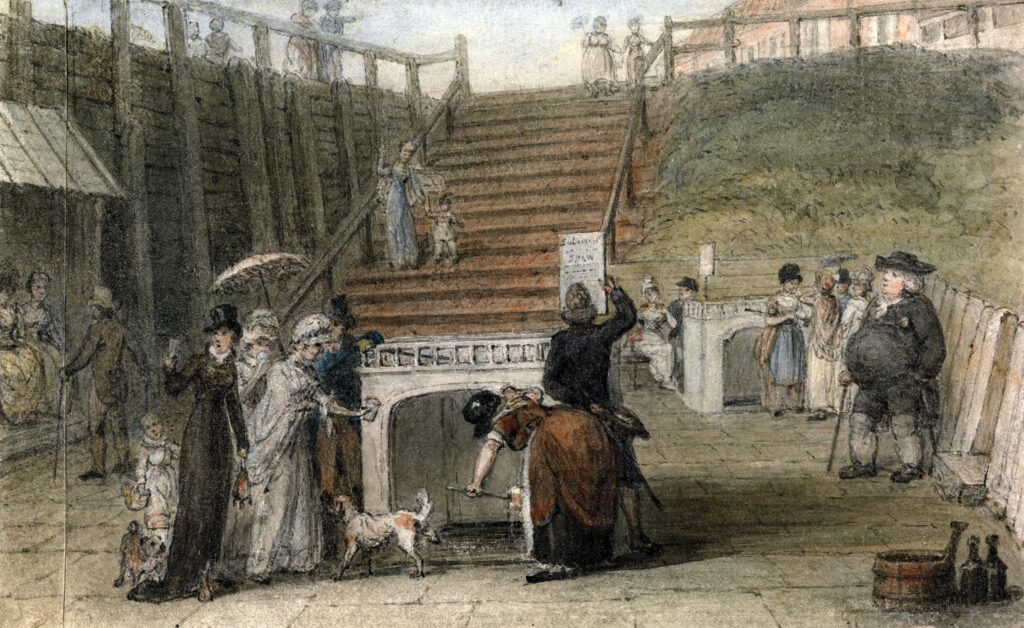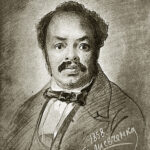24 February 1777: Penniless bohemian Tom Fashion calls on redneck Yorkshire moneybags Sir Tunbelly Clumsy during tonight’s London première of a Sheridan play

James Green’s painting of folk like Tom Fashion taking the waters at the spa at Scarborough (Green 1800ish).
Richard Brinsley Sheridan. 1781. A Trip to Scarborough. London: G. Wilkie. Get it:
.Unedited excerpt
If an excerpt is used in the book, it will be shorter, edited and, where applicable, translated.
SCENE, a Country House.
Enter Young FASHION and LORY.
Y. FASHION.
So here’s our inheritance, Lory, if we can but get into possession-but methinks the seat of our family looks like Noah’s ark, as if the chief part on’t were designed for the fowls of the air, and the beasts of the field.
LORY.
Pray, sir, don’t let your head run upon the orders of building here-get but the heiress, let the devil take the house.
Y. FASHION.
Get but the house! let the devil take the heiress, I say-but come, we have no time to squander, knock at the door- [Lory knocks two or three times.] What the devil have they got no ears in this house? -knock harder.
LORY.
‘gad, sir, this will prove some inchanted castle-we shall have the giant come out by and by with his club, and beat our brains out. (knocks again.
Y. FASHION.
Hush-they come-(from within) who is there?
LORY.
Open the door and see-is that your country breeding?—
SERVANT. (within)
Ay, but two words to that bargain-Tummas, is the blunderbuss prim’d?
Y. FASHION.
Ouns! give ’em good words Lory-or we shall be shot here a fortune catching.
LORY.
Egad sir, I think you’re in the right on’t-ho! -Mr. what d’ye callum-will you please to let us in? or are we to be left to grow like willows by your moat side?
(Servant appears at the window with a blunderbuss)
SERVANT.
Weel naw, what’s ya’re business?
Y. FASHION.
Nothing, sir, but to wait upon Sir Tunbelly, with your leave.
SERVANT.
To weat upon Sir Tunbelly?-why you’ll find that’s just as Sir Tunbelly pleases.
Y. FASHION.
But will you do me the favour, sir, to know whether Sir Tunbelly pleases or not?
SERVANT.
Why look you d’ye see, with good words much may be done.-Ralph, go thy waes, and ask Sir Tunbelly if he pleases to be waited upon-and dost hear? call to nurse that she may lock up Miss Hoyden before the geats open.
Y. FASHION.
D’ye hear that Lory?
Enter SIR TUNBELLY, with Servants, armed with guns, clubs, pitchforks, &c.
LORY.
O (Running behind his master) O Lord, O Lord, Lord, we are both dead men.
Y. FASHION.
Take heed fool, thy fear will ruin us.
LORY.
My fear, sir, ‘sdeath, sir, I fear nothing-(aside) would I were well up to the chin in a horse pond.
SIR TUNBELLY.
Who is it here has any business with me?
Y. FASHION.
Sir, ’tis I, if your name be Sir Tunbelly Clumsey?
SIR TUNBELLY.
Sir, my name is Sir Tunbelly Clumsy, whether you have any business with me or not-so you see I am not asham’d of my name, nor my face either.
Y. FASHION.
Sir, you have no cause that I know of.
SIR TUNBELLY.
Sir, if you have no cause either, I desire to know who you are; for ’till I know your name, I shan’t ask you to come into my house: and when I do know your name, ’tis six to four I don’t ask you then.
Y. FASHION.
(Giving him a Letter) Sir, I hope you’ll find this letter an authentic passport.
SIR TUNBELLY.
Cod’s my life, from Mrs. Coupler.-I ask your Lordship’s pardon ten thousand times-(to his Servant)—Here, run in a doors quickly; get a Scotch coal fire in the great parlour-set all the Turkey work chairs in their places; get the brass candlesticks out, and be sure stick the socket full of laurel, run-(turning to Young Fashion) My Lord, I ask your Lordship’s pardon-(to Servant) and do you hear, run away to nurse, bid her let Miss Hoyden loose again. [Exit Servant. (To Young Fashion) I hope your honour will excuse the disorder of my family-we are not used to receive men of your Lordship’s great quality every day-pray where are your coaches and servants, my Lord?
Y. FASHION.
Sir, that I might give you and your daughter a proof how impatient I am to be nearer akin to you, I left my equipage to follow me, and came away post with only one servant.
SIR TUNBELLY.
Your Lordship does me too much honour-It was exposing your person to too much fatigue and danger, I protest it was-but my daughter shall endeavour to make you what amends she can – and tho’ I say it, that should not say it, Hoyden has charms.
Y. FASHION.
Sir, I am not a stranger to them, tho’ I am to her: common fame has done her justice.
SIR TUNBELLY.
My Lord, I am common Fame’s very grateful humble servant.- My Lord, my girl’s young -Hoyden is young, my Lord; but this I must say for her, what she wants in art, she has by nature-what she wants in experience, she has in breeding-and what’s wanting in her age, is made good in her constitution-so pray, my Lord, walk in; pray, my Lord, walk in.
Y. FASHION.
Sir, I wait upon you.
[Ex. thro’ the gate.]
Comment
Comment
First night 24 February 1777 at Covent Garden. Local interest consists of hints of Yorkshire accents. Is it a variant of Aesop’s town and country mice? Is it really worse than Vanbrugh’s Relapse, on which it is based? Had Sheridan ever been to Scarborough, or was it simply proverbial as a second-rate spa town?
A hoyden was a “A rude, or ill-bred girl (or woman); a boisterous noisy girl, a romp” (OED).
I think the reference to Turkey-work is to demonstrate the backwardness of Yorkshire – see e.g. a petition by Bradford in 1689 complaining about the collapse of the industry there.
Sir Tunbelly Clumsy is alive and well in the Yorkshire scene of Monty Python and the Holy Grail:
Scene 19.—Prince Herbert Yearns for a Certain…Someone..
[The scene is a large, rather run-down English castle with several squat towers and one somewhat tall one. Inside the tall tower, standing before the window are FATHER and HERBERT.]
FATHER: One day, lad, all this will be yours!
HERBERT: What, the curtains?
FATHER: [whacking him on the back of the head] No, not the curtains, lad. All that you can see! Stretched out over the hills and valleys of this land! This’ll be your kingdom, lad!
HERBERT: But, Mother—
FATHER: Father. I’m Father.
HERBERT: But Father, I don’t want any of that.
FATHER: [wandering to and fro] Listen, lad. I’ve built this kingdom up from nothing. When I started here, all there was was swamp. All the kings said I was daft to build a castle in a swamp, but I built it all the same, just to show ’em. It sank into the swamp—so I built a second one. That sank into the swamp. So I built a third one. That burned down, fell over, then sank into the swamp. But the fourth one stayed up. And that’s what your gonna get, lad: the strongest castle in these islands.
HERBERT: But I don’t want any of that. I’d rather—
FATHER: Rather what?!
HERBERT: I’d rather…just… [music] …sing!
FATHER: Stop that, stop that! You’re not going to do a song while I’m here. Now listen lad, in twenty minutes you’re getting married to a girl whose father owns the biggest tracts of open land in Britain.
(Chapman 2019)
The unofficial annotators must be American:
Then apparently her father is a Danish Viking chieftain, because it was the Viking hordes that owned the biggest parts of the British Isles at that time. The Danelaw, as it was called, was essentially an independent nation on the northeast of ‘England,’ and not beholden to English kings at all. In all likelihood, it was the existence of these people that forced Old Saxon to meld with Old Norse to produce Old English, the precursor of our own language. The name ‘Lucky’ is, however, of later Dutch origin (source: American Heritage Dictionary)… If Herbert is a prince, his father must logically be a king, right? Well, king of what? Mercia? Wessex? There were a lot of petty kings around at that time, but not many kings of swamps. He sounds like he’s from lower London, if you ask me, but London isn’t built on a swamp.
The historical episode almost certainly took place at marshy Skipsea Castle, Holderness, in the kingdom of Deira or its successor, Northumbria. But Skipsea Castle, sadly, is no more, and Bodiam Castle, in East Sussex, played Swamp Castle in the film.
Something to say? Get in touch
Similar
 12 April 0627: In a triumph for his Kentish wife, Edwin of Northumbria is baptised on Easter Sunday by Paulinus, in the latter’s wooden oratory on the site of York Minster
12 April 0627: In a triumph for his Kentish wife, Edwin of Northumbria is baptised on Easter Sunday by Paulinus, in the latter’s wooden oratory on the site of York Minster 16 August 1845: The York Herald is conned into posting the American actor Ira Aldridge’s sensational account of his own death
16 August 1845: The York Herald is conned into posting the American actor Ira Aldridge’s sensational account of his own death
Comment
Comment
The excerpt quoted begins around 24:30:
The quote in my title is from the programme intro. A perhaps better one, from Charles Cox: “Notorious memoir of a violent criminal and, briefly, professional boxer. Sykes was a drunken thug who spent much of his life in prison, but his book is nevertheless the work of a sensitive and intelligent man.”
As I understand it, the major threat in the Johore Strait, after the Singapore authorities, is from pollution, not sharks. Does anyone know more about his foreign travel claims, unmentioned in his autobio (Sykes 1991)? Is Wood Street nick the now retired police station in London EC2?
First broadcast dated from the Times TV listings for 4 December 1990:
10.40 First Tuesday.
● CHOICE: Paul Sykes from Wakefield was good enough to fight for the British heavyweight boxing championship, and to take an Open University degree, and his autobiography won an Arthur Koestler literary award. But his life has been a shambles. He has spent nearly half of his 46 years in prison and he has a wild and violent temperament which has often made his high intelligence count for nothing. Nick Lord’s profile follows Sykes through his latest prison sentence and his attempts yet again to build a stable life outside. The signs are not promising. Within three months he is back in trouble. A specialist in roaring invective, a Yorkshire Alf Garnett in manner if not necessarily in substance, Sykes is a rich subject and Lord does him justice. Those looking for the roots of Sykes’s behaviour may find them in his tough upbringing at the hands of a martinet father who, of all things, worked as a prison officer.
Something to say? Get in touch
Search
Donate
Music & books
Place-People-Play: Childcare (and the Kazookestra) on the Headingley/Weetwood borders next to Meanwood Park.
Music from and about Yorkshire by Leeds's Singing Organ-Grinder.


 Bluesky
Bluesky Extwitter
Extwitter